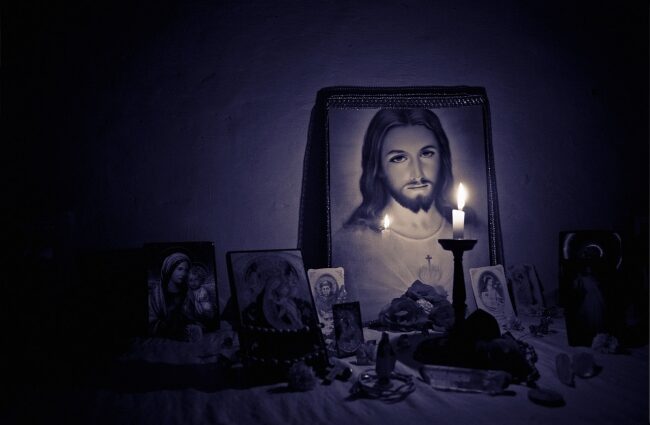Thank you for joining us as we continue celebrating Appalachian poet and novelist, George Scarbrough’s birthday with part 2 of Edward Francisco‘s “Christ-Hauntedness in George Scarbrough’s Invitation to Kim.”
Christ-Hauntedness in Scarbrough’s Invitation to Kim
. . . As before, the reader senses that Scarbrough’s “love of profligate / Word” (7) set him apart, making him an object of both derision and envy. More than once in Invitation to Kim, the poet refers to himself as a fool when it came to being a target for his family’s antics. The boy’s multi-colored, patchwork clothes not only link him, as J. W. Williamson points out in another context, with the motley of court jesters and fools (22), but also with the Biblical Joseph, whose many talents, represented by the coat of many colors, inspired the murderous wrath of his siblings.
While murder may not be the objective of Scarbrough’s brother in “Sonnet for My Brother Lee,” meanness is. The thrust of the poem is how love makes fools of us:
Our mother said, “He makes a dunce of you,
That brother of yours. Why will you play his
fool?”
I had sat atop the pasture gate for him
To try his sling, whether his aim was off
Or true. His aim was true. (30)
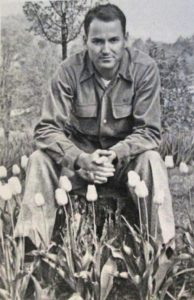
In these lines live both story and lyric. Voices, precious and memorable, echo like songs. Nor can perceptive readers fail to detect the subtle paradoxical insistence that love’s fool is no fool at all. For despite the mischief done to the boy by his brother: “I never learned to distrust him wholly. / Loving him, I loved being his fool.” Thus, in the fashion of that most foolish of lovers—the God on high who prostrates himself for marooned humankind—the poet discovers his willingness to please the family he loves, not because they are deserving or lovable but precisely because they are not. The need to be loved without being able to love in return is another symptom of our broken condition, of the Christ-haunted dysfunctionality that characterizes so many families in the literature written by Southerners. Hence, family for Scarbrough is a sacramental vessel, albeit a broken one, whose very brokenness offers an outpouring of pity and compassion.
Although Scarbrough blunts the sharp edge of his satire when family is the target, he is more reproachful and less forgiving of a community that prides itself on its superficial piety while ignoring its hypocrisies, obsessions, and all to obvious vanities. It stands to reason that a culture hell-bent on adhering rigidly to prescriptive laws will find ways to break its own rules. Biblical literalists are often those most prone to believing in supernatural phenomena of the sort that resist easy verification but that feed the state of mind Thomas Merton once termed “crafty paranoia” (37). In “Excursion,” Scarbrough’s young narrator commits sacrilege by refusing to keep the Sabbath, skipping Sunday School in order to take the path to a dam where the boy’s world widens in a familiar panorama:
The river eddied past,
Wearing a transfer of willows;
Trailing rosespots in decrescent
Lines, a trout swam pastThe imaged leaves.
Well up the river now,
I considered cornsnakes poked to anger,
Yards of hissing color. (25)
Crucial here is the word considered, suggesting the extent to which the boy’s imagination is prepared to accept what follows:
But from the pinnacle
I saw them coming:
Slithering conclave considering
Concert: cottonmouths twisting like
Thick arms in heavy sleeves. (25)
Whether the narrator actually sees what he thinks he does is far less important than his response and the suspension of disbelief required to sustain both fear and image in the same breath. Like the two-headed snakes common in the South’s rustic folklore, Scarbrough’s “gaping mouths” depend more on perception than fact, making us privy to the discovery that
When my eyes cleared, they were gone,
As if at signal. My feet came loose.
Gulping my own sour slobber, I ran
As runners do who bring a message home. (26)
Doubtless the disappearing serpents exact a confession of truancy from the boy once he arrives home, nor is he likely to forget the intended spiritual lesson: Special crimes require special punishments. Moreover, transgressing God’s laws can call into existence powers and principalities a mere boy is helpless to resist. Indeed, grace, as Flannery O’Connor reminds us, often wears many disguises, some downright terrifying.
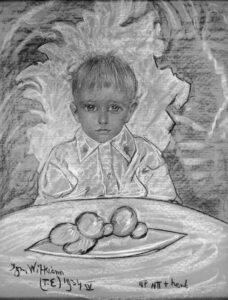
It is no wonder that the recipients of such grace would be reluctant to express thanksgiving for meager fare for which hard labor seemed to pay the only price. Perhaps no ritual among the folk of Southern Appalachia has inspired more ambivalence than the act of praying over a meal. Such is the case in Scarbrough’s “Grace,” where even ambivalence flies out the window, a poorly fed bird in search of fatter worms and more abundant ground cover. As Scarbrough points out, “We groaned no thanks / At our ungroaning board.” To do so would only have acknowledged God’s stinginess and belied the fact that “What we had was ours, / Paid for with blister and cramp.” Thus, every supper was a sardonic reenactment of the Last Supper, with Scarbrough’s father “gibing at misery” and proclaiming that “We’ll eat what there is first / And save what there isn’t for later.” In imitation of a robust eucharistic appetite, the father swills his cup
Of poor porridge,
Turning the vessel
Upside down at his place,Signifying
It is finished.
By contrast the poet “sipped along with [his] mother, / Amazed at the depth // Of a shallow share.” Yet the boy’s sympathies are clearly with his father whose “hungry seven” have been all but abandoned by that other Patriarch, the One sitting on high who remains curiously indifferent to the plight of his children. Refusing to make excuses for such a God, the poet offers an unqualified guarantee that
If God passed by at the road,
I assured myself,Tonguing the last drop,
Inverting my own cup,
Instead of gaping and groveling,
I’d spit in the sucker’s eye. (54)
In Scarbrough’s community, children often pose as hollow-eyed reminders of a neglect perpetuated by circumstances beyond anyone’s control. Nor is it easy to fathom the will of a God who requires His own Son’s blood in reparation for humankind’s eternal indebtedness. By divine example, then, children are reminded of their tenuous status and of the need to be useful in order to justify their existence. Above all, they must pretend not to know they are unwanted, a truth Scarbrough courageously confronts in “Unwanted Children on This Wanted Hill.”
Careful to mitigate an excess of sentiment, Scarbrough adopts the fixed form of a villanelle as a fitting container for so much genuine sadness. One is reminded of the fierce grief in Dylan Thomas’ “Do Not Go Gentle Into That Good Night,” arguably the most effective villanelle written in English, though I would maintain that Scarbrough’s less famous poem matches Thomas’ effort step for step. For instance, just as Thomas’ lyric uses the five triplet stanzas to describe types of men subject to death, Scarbrough’s triplets describe types of “unwanted children.” There are the “meek ones,” the “harsh ones,” the “ribalds,” and those who “are not the bitter lot.” A close examination of the structure of Scarbrough’s villanelle will show that the children’s activities are reinforced by rhymes suggesting a desire to play and sway. In contrast, those adults who would “kill / The morning’s image” with their wrath find their tendencies echoed in such rhymes as kill and swill. Ever the consummate craftsman, Scarbrough offers what is ultimately a prayer for these children in the final quatrain. Here the predetermined form of the villanelle requires that refrain lines one and three recur as the penultimate and final lines of the poem. As a result, Scarbrough asks for the children what they cannot ask for themselves: “Unwanted children on this wanted hill, / O be thou wanted by a fiercer will” (116).
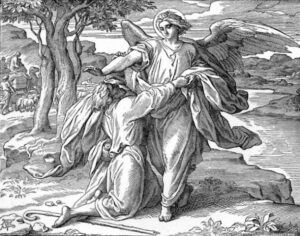
To be unwanted and not to know why is at the core of Scarbrough’s metaphysics. Like Jacob’s wrestling match with the angel, Scarbrough’s argument is ultimately with God. It is an argument honorably expressed. For why would a loving god fashion children in His own image only to abandon them to the effects of sin, entropy, and the Second Law of Thermodynamics? The question has been asked down through the ages and may find its most sublime expression in the groanings of the psalmist. How fitting, then, that Scarbrough would resurrect the inquiry for a soundbite culture that has forgotten both the question and how to ask it. He reacquaints us with what Paul Tillich once termed our “ultimate concerns.” Essential to note, however, is that Scarbrough is foremost a poet, not a theologian. He is less interested in presenting a consistent theology than in offering a truth consonant with his experience. Yet a dimension of spirituality, of Christ-hauntedness, is undeniable in his work. Even when he professes not to believe, he reinforces the need for believing. Few poems in Invitation to Kim address this paradox more directly than “Though I Do Not Believe.” In a series of short, cascading lines, the poet gently announces his unbelief in the very entities that make belief impossible:
In God the Father
In God the Father’s Son
Nor that Other Emissary
Spooky as milkweed down. (113)
Throughout the poem, Scarbrough resists the age’s temptation to believe too easily in what it fails to comprehend. He refuses to deconstruct the triune deity as a way of bypassing mystery and of avoiding the anxiety required for an authentic connection with the One whose name has remained a secret since the beginning of time. Indeed, Scarbrough will not call God by the name assigned to Him since to do so is to risk God’s semiotic extinction by reducing Him to a thing, a container for all our projections, fantasies and distortions. Rather, God is, in Scarbrough’s nomenclature, no mere thing but
Thou It of Things
So variously named
So curiously called
God the Father
God the Father’s Son
God the Father’s Other Emissary
Spooky as milkweed down
As a dandelion’s uneasy head
Exploded by pouting lips
On the mystery of wind. (132)
Even as Scarbrough details the machinery by which orthodox religion has clanked along for centuries, the structure of his short-lined free verse completes the proposition that “Though I do not believe . . . I am not afraid.” The enjambed lines and absence of end punctuation underscore an ongoing faith that precludes fear, making the “leap . . . exquisite.”
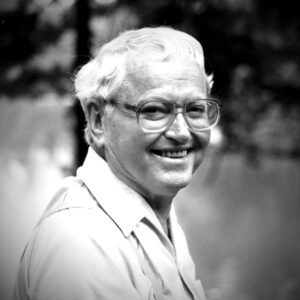
This leap of faith is at the core of Scarbrough’s Invitation to Kim, though the sort of faith we are talking about is not that which anticipates finding anything in particular. To do so would simply be to participate in a conjuring act, a trick of spurious word magic calculated to produce little more than despair for the reader. Instead, Scarbrough reserves the right to be surprised, as well as to surprise us with discoveries only authentic poetry can uncover. To this end, Scarbrough’s “Small Poem” lets us make large discoveries about the possibility of resurrection in the face of small, daily crucifixions. With the brevity and profundity of linked haiku, Scarbrough describes the singular condition by which each of us is “Walking / the paths of his own / premise.” Nor is life anything so much as “fixing the right word / daily nail-like into / its post.” The result is a familiar image, one “speaking exactly / crossbar and / beam.” Hence, by walking, fixing, speaking, and “living with / utmost precision,” we may suddenly discover that “a man could / eventually go away / without leaving” (118). Death, then, is not a departure but the sudden discovery that we are finally home and that everything in our lives has led us to this remembered place of completion. Scarbrough seems to echo this interpretation when he remarks in one interview that “Home was always just over the hill, the honey and grapes always just out of sight. I’m not being cynical. We humans are just built that way in all our searches and seizures” (Personal interview).
To be haunted by the “unremovable memory” of where we have been and of the place to which we are returning is a recurring preoccupation in George Scarbrough’s Invitation to Kim. In language combining the best of the formal and vernacular traditions, Scarbrough records the progress, in Flannery O’Connor’s memorable but borrowed phrase, “of several rough beasts slouching towards Bethlehem to be born.” His work rescues ordinary experience from the simulacrum of cliché by insisting on a fierce singularity in describing what we often fail to notice: our own status as ragged wayfarers hobbling toward a dream of home. With all the love and skill that a lifetime of craft and inspiration can provide, Scarbrough helps us recall that dream.
Visit these pages on Appalachia Bare to read other articles about George Scarbrough:
- Lost and Found Poems: George Scarbrough
- George Scarbrough – Poet in the Vale
- Appalachia’s Sons: A Triptych of Talent
Sources:
- Eliot, T. S. (1962). The Waste Land and Other Poems. New Yor: Harcourt Brace Jovanovich.
- Mackin, Randy. (2011). George Scarbrough, Appalachian Poet. Jefferson: McFarland & Co.
- Merton, Thomas. (1966). Raids on the Unspeakable. New York: New Directions.
- Scarbrough, George. (1989). Invitation to Kim. Memphis: Iris Press.
- Scarbrough, George. (1996). (E. Francisco, Interviewer)
- Williamson, J. W. (1995). Hillbillyland. Chapel Hill: Univ. of North Carolina Press.
**Featured image: ha11ok from Pixabay
